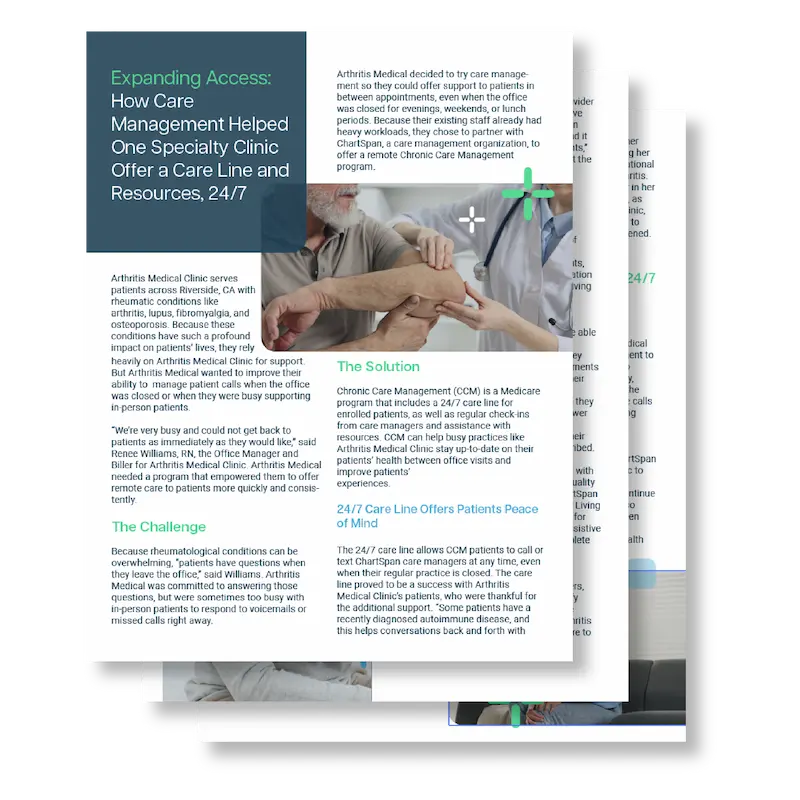
Talk with a ChartSpan Representative Today!
Our team is ready to help you improve patient care and outcomes.
Blog
What is Patient Self-Management? How to Empower Patients in Your Practice
Without question, healthcare providers play a critical role in supporting patients’ well-being. However, so much of patients’ health lies within their control.
A provider might prescribe a medication, but if the patient doesn’t follow the regimen, the pills are ineffective. Likewise, a care team might know the warning signs of a serious condition, but if symptoms go unreported by the patient, minor health issues can quickly become acute needs.
These examples illustrate the importance of patient self-management. Patients who take an active role in their healthcare stand to achieve better outcomes and experiences. When patients engage in the healthcare delivery process, they can also reduce the cost of healthcare and create more efficiency.
So, how do you empower your patients to take charge of their health? And for which patients does self-management matter most? This article explores the answers to these questions and more tips for equipping patients in your care.
What is patient self-management?
Patient self-management refers to the skills and techniques patients use to actively manage their health conditions. Engaged patients are curious about their health, motivated to manage their conditions, attentive to their symptoms, and empowered to speak up. They have the confidence and knowledge to ask important questions, connecting the dots in their medical narratives.
These qualities are particularly vital for patients managing chronic conditions since preventive, proactive interventions can minimize the incidence of serious complications. Important patient self-management skills include:
- Setting lifestyle-compatible health goals
- Noticing medical symptoms
- Notifying care managers of health changes
- Developing medical literacy, particularly in topics related to patients’ own conditions
- Self-monitoring of vitals, such as blood pressure, heart rate, or glucose levels
- Asking questions, seeking to understand and make informed decisions
Patient self-management also requires diligence and consistency. For patients who take an active role in their care, a clear understanding of the overall goal motivates the steps needed to reach it.
Why is self-management important for chronic disease patients?
Self-management in healthcare can have many positive effects, with better patient outcomes at the top of the list. When patients become the captains of their healthcare journeys, they are more likely to receive timely, proactive care. This, in turn, reduces their chances of developing emergent issues or complex conditions.
Patient self-management improves overall health outcomes through better communication between patients and providers. Patients who can articulate their precise symptoms, health history, and concerns are more likely to experience timely and effective care personalized to their unique needs. Further, this ability to speak up gives patients a sense of autonomy and can reduce the burden on providers by creating greater opportunities for proactive rather than reactive measures.
Health self-management skills benefit patients with chronic conditions. These patients are at a higher risk for developing serious health issues that require more interventions. However, when they're engaged in their treatment, chronic disease patients can help manage their conditions’ complexity and achieve better health. They become like symphony conductors, understanding each care provider's role in their overall wellness goals.
The importance of self-care and self-management for patients with chronic conditions
Self-care and self-management are crucial concepts for patients with chronic conditions. These terms encompass various activities and responsibilities patients undertake to manage their health effectively. Self-care refers to daily routines and behaviors aimed at maintaining health and preventing illness, while self-management addresses the ongoing, active management of chronic health conditions.
Self-care maintenance
For chronic disease patients, self-care maintenance encompasses any steps patients take to progress toward their care goals. These maintenance tasks vary widely depending on a patient’s unique needs and can include:
- Following exercise recommendations
- Maintaining a healthy diet
- Taking medications as directed
- Promptly refilling prescriptions as needed
- Getting sufficient sleep and rest
- Adopting a positive mental outlook
- Connecting with friends and family
- Staying well hydrated
- Attending scheduled care appointments
- Following emergency care plans if needed
Patients who commit to self-care maintenance not only stand to enjoy better health outcomes but also gain a sense of control and confidence.
Self-care monitoring
Health status is inherently dynamic, with key indicators such as vital signs and symptoms fluctuating daily and across longer periods. Effective self-management of chronic diseases relies on consistent monitoring of these indicators. Examples of self-care monitoring could include:
- Asthma: peak flow readings, symptom triggers, wheezing, coughing, chest tightness, shortness of breath
- Congestive Heart Failure: blood pressure, weight, sleep, oxygen use
- Diabetes: blood glucose levels, A1C, carbohydrate intake, foot health
- Hypertension: blood pressure, stress levels, weight, diet, activity levels
- Sleep Apnea: blood oxygen levels, heart rate, breathing patterns, breath rate, morning headaches
- Osteoporosis: back pain, calcium and vitamin D intake, bone fractures
The specific metrics to monitor depend on individual patients, their health goals, and their chronic conditions. While some self-care monitoring requires a measurement device, like a blood pressure cuff or peak flow meter, many metrics don’t require anything except attention and the right support system.
How can you empower patients toward self-management?
As a provider, you must create conditions to support patient self-management. Here are a few simple steps to build the proper framework for patient empowerment.
- Embrace a patient-centered approach to care. That means fostering an environment where patients are heard, treated with respect, and invited to participate in their healthcare decisions.
- Offer education and training on chronic disease self-management. Don’t assume patients have any prior knowledge of managing their chronic conditions.
- Provide access to health data. Embrace transparency so that patients can track progress, revisit notes, and develop clear narratives of their own health.
- Address patient questions and concerns. Recognize that patient health is a joint effort requiring clarity and consensus.
- Connect patients to support networks. Community and peer resources can reduce isolation, build self-management skills, and support mental health for patients.
- Implement a CCM program. CCM programs reinforce a patient-centered approach by integrating education, data access, personalized support, and community connections into routine care management.
Why implement a CCM program for your patients?
Patient self-management support is a key tenant of the Chronic Care Model, the framework upon which Chronic Care Management (CCM) is built. Implementing a CCM program can improve care delivery and support a preventive care approach for patients with one or more chronic diseases.
Many practices find that partnering with a CCM program provider eases the burden of implementing one. Providers like ChartSpan can help ensure the program is effective for patients, including supporting patient self-management.
For example, ChartSpan care coordinators can follow up with patients every month, a task many practice staff don’t have time for. We also support patient self-management by ensuring patients have access to care plans, following up on care goals, and adjusting them as needed. Our care managers also check in on medication adherence, send timely reminders for prescription refills, and educate patients on their conditions.
Encourage your patients to participate in your CCM program
Chronic Care Management programs are voluntary, meaning they can only support chronic disease self-management if patients choose to participate. So, it’s not enough to offer a CCM program. You’ll also need to encourage patients to enroll. Understanding which patients qualify for the program is a great place to start.
According to the reimbursement rules set by the Centers for Medicare & Medicaid Services (CMS), eligible patients must be Medicare beneficiaries with two or more qualifying chronic conditions that are expected to cause significant decline or death. They also must have visited your practice within the last year, unless you conduct an initiating visit with them to meet that requirement.
Once you’ve identified patients who qualify for CCM, it’s important to educate them on the program’s value and purpose. Instead of relying on clinical staff, ChartSpan recommends assigning an enrollment specialist or team to the role. Ideally, this person should be able to understand the program’s unique billing requirements and be a compelling communicator and advocate for the program’s value. If you partner with a CCM provider, like ChartSpan, we can offer trained enrollment specialists to educate patients on the program’s requirements and offerings.
Chronic Care Management improves patient outcomes through patient-centered care
The core components of CCM Medicare requirements are designed to support patient-centered care. Features like personalized care plans, monthly patient touchpoints, self-management support, and 24/7 care access all help to put patient needs and preferences at the center of care. At the same time, these features improve patient outcomes, with reduced risk of emergencies, fewer complications, and healthier patients.
- Personalized care plans: Each patient receives a care plan tailored to their specific conditions and health goals. This custom approach allows for more precise and effective management of their health, accommodating unique needs and preferences.
- Monthly patient touchpoints: Regular outreach to patients ensures continuous monitoring and creates opportunities to adjust the care plan. This ongoing engagement helps care coordinators detect and intervene in potential health issues, reducing the risk of emergencies.
- Self-management support: CCM programs equip patients with the tools and knowledge to manage their conditions. This empowerment leads to better daily health management and contributes to long-term disease control.
- 24/7 care access: Providing patients with round-the-clock access to care ensures they can receive assistance whenever needed, particularly in urgent situations. Having an open line of communication with providers helps patients prevent complications and manage acute episodes effectively.
- Integration of care: CCM often involves coordination among various healthcare providers. This integrated approach ensures that all patient health aspects are considered and managed holistically, leading to more comprehensive care.
By integrating these features, CCM enhances patient autonomy and engagement, improving health outcomes. Ultimately, CCM's proactive and personalized nature supports a healthier, more informed patient population.
Enhancing chronic disease management with ChartSpan's CCM program
ChartSpan is a leader in Chronic Care Management, partnering with healthcare providers to deliver outstanding patient-centered care for those with chronic conditions. We provide patients with:
- Personalized follow-ups: ChartSpan care managers provide regular follow-ups to ensure continuous engagement and support, allowing healthcare providers to focus on direct patient care.
- Accessible care plans: We ensure that patients have easy access to their personalized care plans, allowing them to stay informed and engaged in their health management.
- Goal monitoring and adjustments: Our team continuously monitors patients' progress toward their health goals and adjusts goals in collaboration with patients to better suit their evolving needs.
- Medication management: We help manage medication adherence and ensure timely prescription refills, which are vital for effective disease management.
- Educational support: Patients receive education about their conditions, empowering them with the knowledge to manage their health effectively.
ChartSpan’s SMART goals for chronic disease management
Our approach integrates seamlessly with existing medical services, enhancing patient engagement and health outcomes by strategically applying the SMART (Specific, Measurable, Achievable, Relevant, Time-specific) goal-setting framework. This collaboration ensures that each patient's management plan is tailored to their specific needs, keeping them motivated and on track to achieve optimal health results. With ChartSpan's CCM program, patients receive the structured support they need to manage their health effectively.
Here are some example SMART goals for a patient with hypertension, which would be created with the provider’s oversight and the patient’s input:
- Start with walking 20 minutes a day, five days a week.
- Be active for at least 10 minutes each day.
- Join a local gym or group exercise class within the next month.
- Find an exercise partner within the next three weeks.
- Record daily workouts in an exercise journal.
- Stand up and stretch or walk every hour.
- Use a pedometer to set and achieve daily step goals.
ChartSpan's CCM program is more than just a set of services—it's a partnership with your practice that enhances the quality of life for patients with chronic conditions. By incorporating comprehensive care coordination, personalized support, and educational resources, ChartSpan empowers patients to actively manage their health.
Take the next step toward excellent care management with ChartSpan. Talk to an expert to discover how our services can benefit your practice.
You may also like:
Subscribe for More Insights
Get valuable resources delivered straight to your inbox.
"*" indicates required fields






